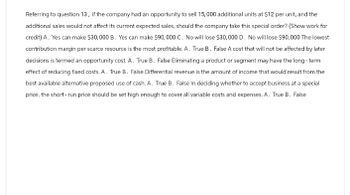
FINANCIAL ACCOUNTING
10th Edition
ISBN: 9781259964947
Author: Libby
Publisher: MCG
expand_more
expand_more
format_list_bulleted
Question

Transcribed Image Text:Referring to question 13, if the company had an opportunity to sell 15,000 additional units at $12 per unit, and the
additional sales would not affect its current expected sales, should the company take this special order? (Show work for
credit) A. Yes can make $30,000 B. Yes can make $90,000 C. No will lose $30,000 D. No will lose $90,000 The lowest
contribution margin per scarce resource is the most profitable. A. True B. False A cost that will not be affected by later
decisions is termed an opportunity cost. A. True B. False Eliminating a product or segment may have the long-term
effect of reducing fixed costs. A. True B. False Differential revenue is the amount of income that would result from the
best available alternative proposed use of cash. A. True B. False In deciding whether to accept business at a special
price, the short-run price should be set high enough to cover all variable costs and expenses. A. True B. False
SAVE
AI-Generated Solution
info
AI-generated content may present inaccurate or offensive content that does not represent bartleby’s views.
Unlock instant AI solutions
Tap the button
to generate a solution
to generate a solution
Click the button to generate
a solution
a solution
Knowledge Booster
Similar questions
- Do problem 4, a through h.arrow_forwardBates Company plans to add a new item to its line of consumer product offerings. Two possible products are under consideration. Each unit of Product A costs $18 to produce and has a contribution margin of $9, while each unit of Product B costs $30 and has a contribution margin of $10. What is the differential revenue for this decision? Multiple Choice O O $21 $1 $13 $12arrow_forward3) If demand for 2022 is instead 2,500 units should the company pay to increase their capacity? Why? Please explain your calculations and reference to the chart in Figure 1. Assume units are sold at the normal price. Please mention the concept of incremental profits. Hint: If you expand capacity, you will have to pay additional fixed costs of $25,000. Remember that fixed costs are fixed within the relevant range. If you expand capacity then you are outside this range. If you expand capacity then you can make revenue on 500 additional units at the normal price and would pay variable costs on 500 additional units. Please consider the incremental profit or loss of expanding capacity. The incremental profit is the increase in revenues minus the increase in costs of adding 500 more units. If the incremental profit of expanding capacity is positive then you should do so.arrow_forward
- Solve 2, the first answer is the wrong. Find the lowest acceptable transfer price.arrow_forwardQ1.Determine the production plan that will maximise the weekly profit of MJD Ltd and prepare a profit statement showing the profit your plan will yield. Q2.The marketing director of MJD Ltd is concerned about the company’s ability to meet the quantity demanded by its customers. Two alternative strategies are being considered to overcome this: To increase the number of hours worked using the existing machinery by working overtime. Such overtime would be paid at a premium of 50% above normal labour rates, and variable overheads costs would be expected to increase in proportion to labour costs. To buy product B from an overseas supplier at a cost of £19 per unit; which includes the cost of delivery. This purchased product would need to be repackaged at a cost of £1 per unit before it can be sold Evaluate each of the two alternative strategies and write a report to the marketing director discussing which strategy should be adopted.arrow_forwardHelp!arrow_forward
arrow_back_ios
arrow_forward_ios
Recommended textbooks for you

 AccountingAccountingISBN:9781337272094Author:WARREN, Carl S., Reeve, James M., Duchac, Jonathan E.Publisher:Cengage Learning,
AccountingAccountingISBN:9781337272094Author:WARREN, Carl S., Reeve, James M., Duchac, Jonathan E.Publisher:Cengage Learning, Accounting Information SystemsAccountingISBN:9781337619202Author:Hall, James A.Publisher:Cengage Learning,
Accounting Information SystemsAccountingISBN:9781337619202Author:Hall, James A.Publisher:Cengage Learning, Horngren's Cost Accounting: A Managerial Emphasis...AccountingISBN:9780134475585Author:Srikant M. Datar, Madhav V. RajanPublisher:PEARSON
Horngren's Cost Accounting: A Managerial Emphasis...AccountingISBN:9780134475585Author:Srikant M. Datar, Madhav V. RajanPublisher:PEARSON Intermediate AccountingAccountingISBN:9781259722660Author:J. David Spiceland, Mark W. Nelson, Wayne M ThomasPublisher:McGraw-Hill Education
Intermediate AccountingAccountingISBN:9781259722660Author:J. David Spiceland, Mark W. Nelson, Wayne M ThomasPublisher:McGraw-Hill Education Financial and Managerial AccountingAccountingISBN:9781259726705Author:John J Wild, Ken W. Shaw, Barbara Chiappetta Fundamental Accounting PrinciplesPublisher:McGraw-Hill Education
Financial and Managerial AccountingAccountingISBN:9781259726705Author:John J Wild, Ken W. Shaw, Barbara Chiappetta Fundamental Accounting PrinciplesPublisher:McGraw-Hill Education


Accounting
Accounting
ISBN:9781337272094
Author:WARREN, Carl S., Reeve, James M., Duchac, Jonathan E.
Publisher:Cengage Learning,

Accounting Information Systems
Accounting
ISBN:9781337619202
Author:Hall, James A.
Publisher:Cengage Learning,

Horngren's Cost Accounting: A Managerial Emphasis...
Accounting
ISBN:9780134475585
Author:Srikant M. Datar, Madhav V. Rajan
Publisher:PEARSON

Intermediate Accounting
Accounting
ISBN:9781259722660
Author:J. David Spiceland, Mark W. Nelson, Wayne M Thomas
Publisher:McGraw-Hill Education

Financial and Managerial Accounting
Accounting
ISBN:9781259726705
Author:John J Wild, Ken W. Shaw, Barbara Chiappetta Fundamental Accounting Principles
Publisher:McGraw-Hill Education